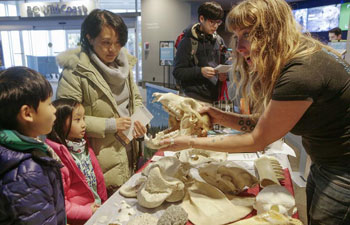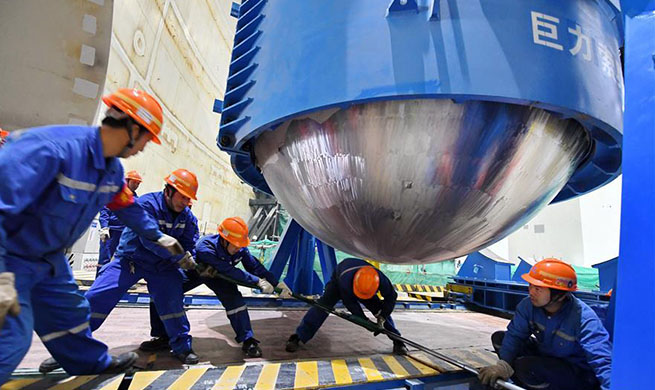By Gao Lu, Huang Chao, Xia Lin
NEW YORK, Jan. 28 (Xinhua) -- While international admission by U.S. universities and colleges shows signs of flattening in the past two years, Fan Yilan, the sophomore at the University of Texas (UT) at Austin, still feels a strong growth of Chinese enrollment against the general trend.
"In China, it's not in decline at all. It's in the opposite way. It's increasing. There're more Chinese students seeking education abroad in the United States," the girl from Beijing told Xinhua.
WEALTH AND PROSPECTS
The annual Open Doors Data released in November by the Institute of International Education of the United States (IIE) showed that the students from China to U.S. higher education topped 350,700 in the academic year of 2016/17, a rise of 6.8 percent over the previous year.
They accounted for 32.5 percent of the whole international students in the United States, topping the ranks for the eighth year.
"We would like to join it and experience more. I think that's the main part why we choose to study abroad. We want to learn what they do here and to enjoy the experience of studying abroad," said Fan, who majors in accounting and economy.
The IIE report also said that despite the "strong growth in the number of international students studying in the United States in the past decade, with an increase of 85 percent since 2006/07, the new findings signal a slowing of growth, with a 3 percent increase compared to increases of 7 to 10 percent for the previous three years."
Thousands of kilometers away in eastern America, admission officials and students at the University of Southern California (USC) gave sharper insights, for it is centrated and diversified in international students, especially Chinese.
"As Chinese develops better and better, more people are able to afford the tuition fees. Most of the top education institutions are located in the United States and Europe, so Chinese parents want to send their kids outside to open their mind and to explore different education systems," Joyce Wang, a Chinese student at USC, told Xinhua.
Ben Lee, Associate Director of Master of Communication Management Program at USC, noticed that Chinese parents need to be more calculative in sending their children to study in the United States.
"I would say that at the same time, the outcome for a student and his family investing in overseas education is no longer that simple. The Chinese market and its employers can now distinguish overseas students with strong experiences from strong programs from those who are just there from a mediocre program and not working hard to benefit from their stay abroad," Ben told Xinhua.
SHATTERING STEREOTYPE AND INTEGRATE
U.S. media reports used to depict Chinese students as nerd or just rich kids, but actually more of them are breaking this stereotype.
"We're participating in all the organizations and trying to take initiative to position ourselves," said Fan, strongly denying the media reports.
During her freshman year, Fan joined an Asian interest authority and made a lot of local friends to have fun together, which provided her with better understanding of the culture.
She also undertakes volunteer jobs and fundraising with schoolmates, as well as helps organize some events to promote Asian culture.
"So I think it is really a fun part not only me, but a lot of my friends. We are really trying to participate in all the events in college," she added.
GOING HOME AFTER GRADUATION
As those coming to America are on the rise, the number of returnees with competitive degrees and promising projects has been going strong, too.
According to the education branch of the Chinese Embassy in the United States, the total number of Chinese youth studying in America and then going home after graduation has been rising in the past 5 years.
Cen Jianjun, the diplomat in charge of education affairs, recently told Xinhua that the surge back home has corresponded with the prosperity of their motherland, which promises preferential policies and better prospects.
"They pin hope on China's future," added Cen.

















